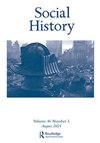The commercialisation of Bengali food: insights into caste, class and commensality in colonial Bengal
IF 1.1
1区 历史学
Q1 HISTORY
引用次数: 0
Abstract
ABSTRACT This article argues that the failure of early twentieth-century novelistic, autobiographical and periodical literature to acknowledge or celebrate the novelty and social significance of the commercialisation of Bengali food reflected the deeply rooted caste and class prejudices underlying the dietary choices and literary styles of the Bengali bhadralok (educated middle class). As late as the 1970s, eminent Bengali littérateurs lamented the non-availability of ready-to-eat Bengali food, notwithstanding the fact that a chain of new public eateries called Pice hotels had been serving home-style Bengali food since the 1920s. The gastronomic revolution ushered in by these eateries was more or less ignored in contemporary print literature, with the notable exception of Bibhuti Bhushan Bandopadhyay’s celebrated novel, Adarsha Hindu Hotel, written in 1940. The failure of Bengali writers to acknowledge the pioneering role of Pice hotels in offering a socially inclusive dining experience in Bengal contrasted with their effusive celebration of the new culinary experiments that created a cosmopolitan eating culture of public dining in the colonial city of Calcutta at the turn of the twentieth century.孟加拉食物的商业化:对孟加拉殖民地种姓、阶级和共通性的洞察
本文认为,20世纪早期的小说、自传和期刊文学未能承认或庆祝孟加拉食品商业化的新颖性和社会意义,这反映了根深蒂固的种姓和阶级偏见,这些偏见隐藏在孟加拉bhadralok(受过教育的中产阶级)的饮食选择和文学风格之下。直到20世纪70年代,著名的孟加拉人还在哀叹没有现成的孟加拉食品,尽管自20世纪20年代以来,一批名为“价格酒店”(price hotels)的新公共餐馆已经开始供应家常式孟加拉食品。这些餐馆带来的美食革命在当代印刷文学中或多或少被忽视了,除了比布蒂·布山·班多帕德海伊(Bibhuti Bhushan Bandopadhyay) 1940年写的著名小说《阿达尔沙印度教酒店》(Adarsha Hindu Hotel)。孟加拉作家未能承认派斯酒店在孟加拉提供社会包容性餐饮体验方面的先锋作用,与之形成鲜明对比的是,他们对20世纪初殖民城市加尔各答公共餐饮的国际化饮食文化的新烹饪实验充满热情的庆祝。
本文章由计算机程序翻译,如有差异,请以英文原文为准。
求助全文
约1分钟内获得全文
求助全文
来源期刊

Social History
HISTORY-
CiteScore
1.10
自引率
0.00%
发文量
37
期刊介绍:
For more than thirty years, Social History has published scholarly work of consistently high quality, without restrictions of period or geography. Social History is now minded to develop further the scope of the journal in content and to seek further experiment in terms of format. The editorial object remains unchanged - to enable discussion, to provoke argument, and to create space for criticism and scholarship. In recent years the content of Social History has expanded to include a good deal more European and American work as well as, increasingly, work from and about Africa, South Asia and Latin America.
 求助内容:
求助内容: 应助结果提醒方式:
应助结果提醒方式:


